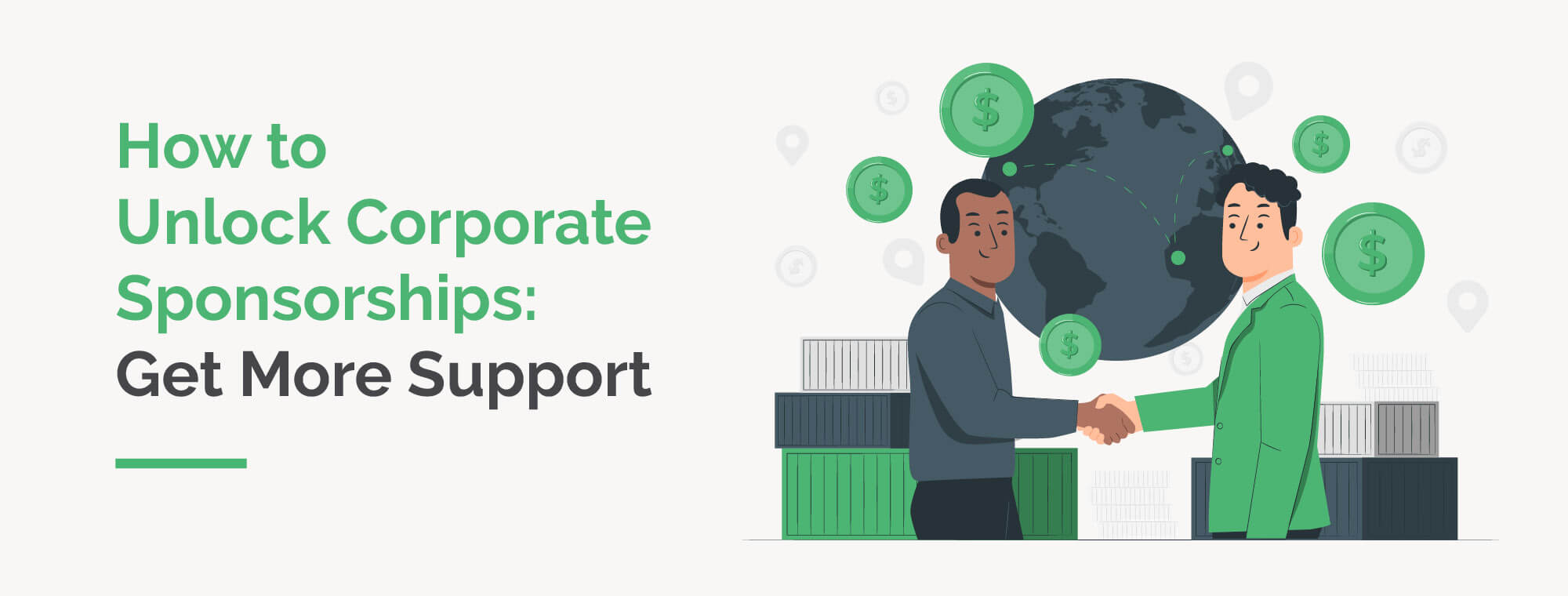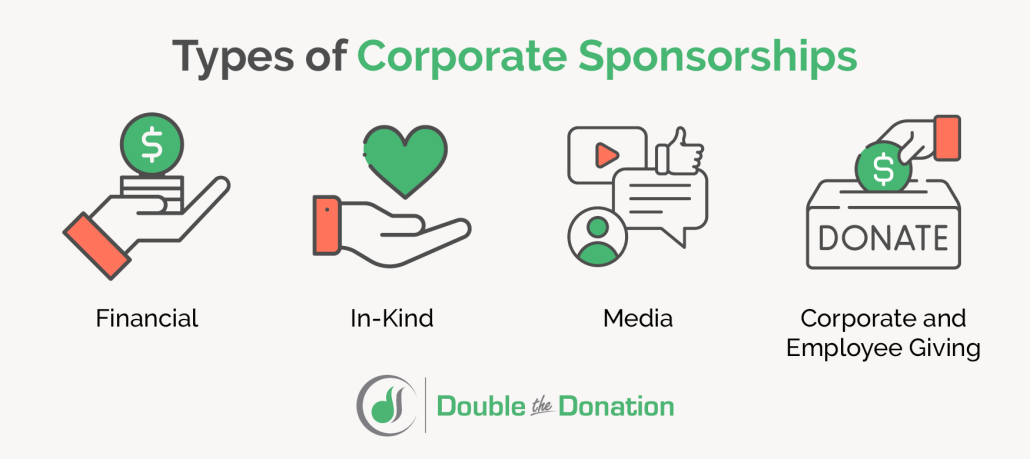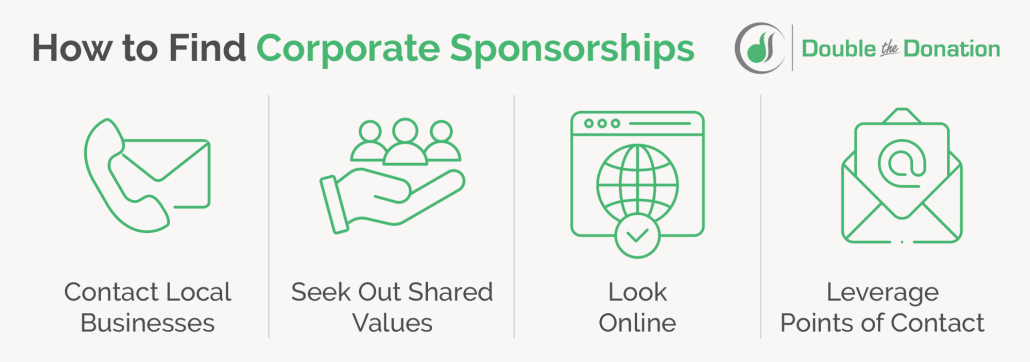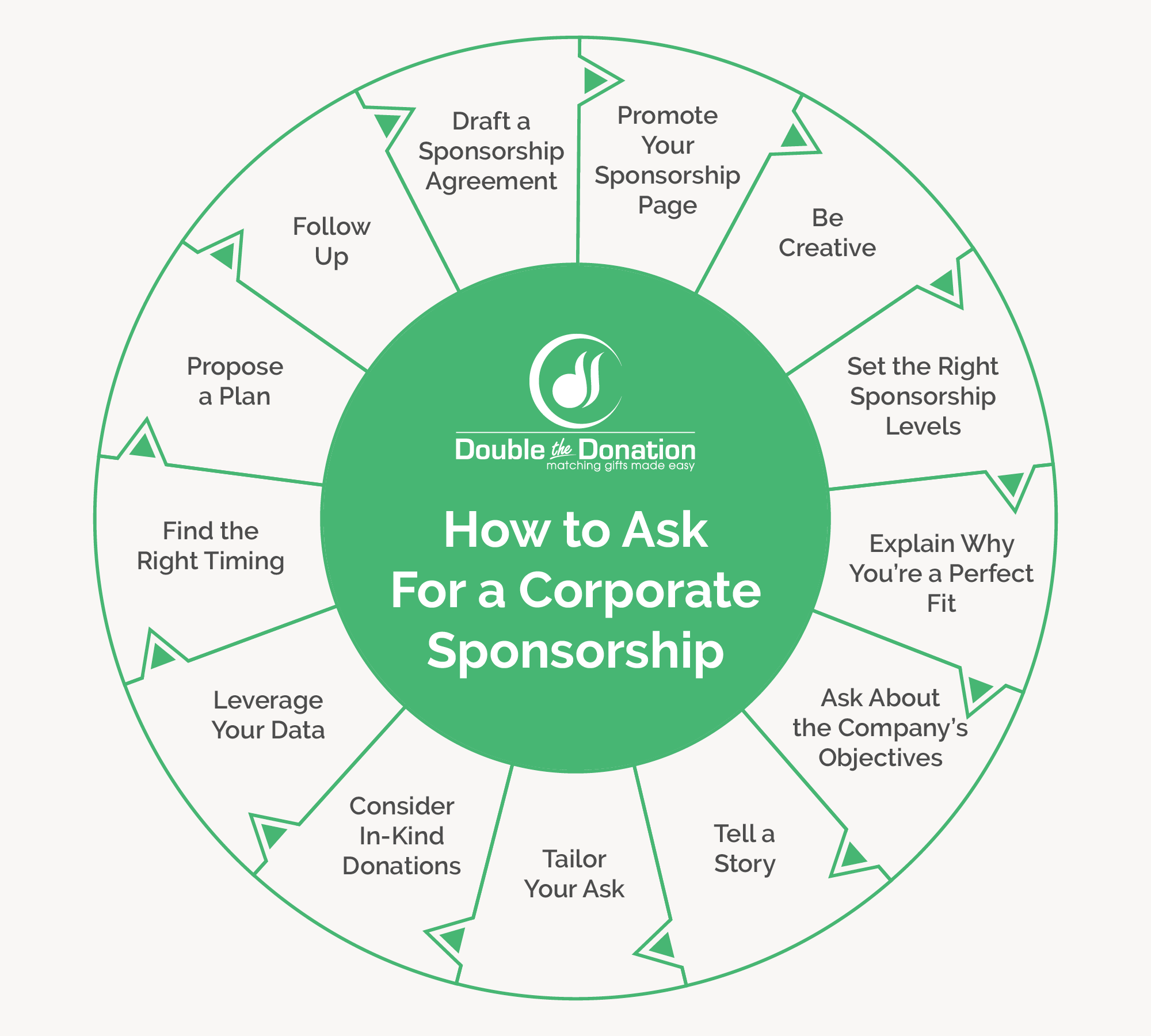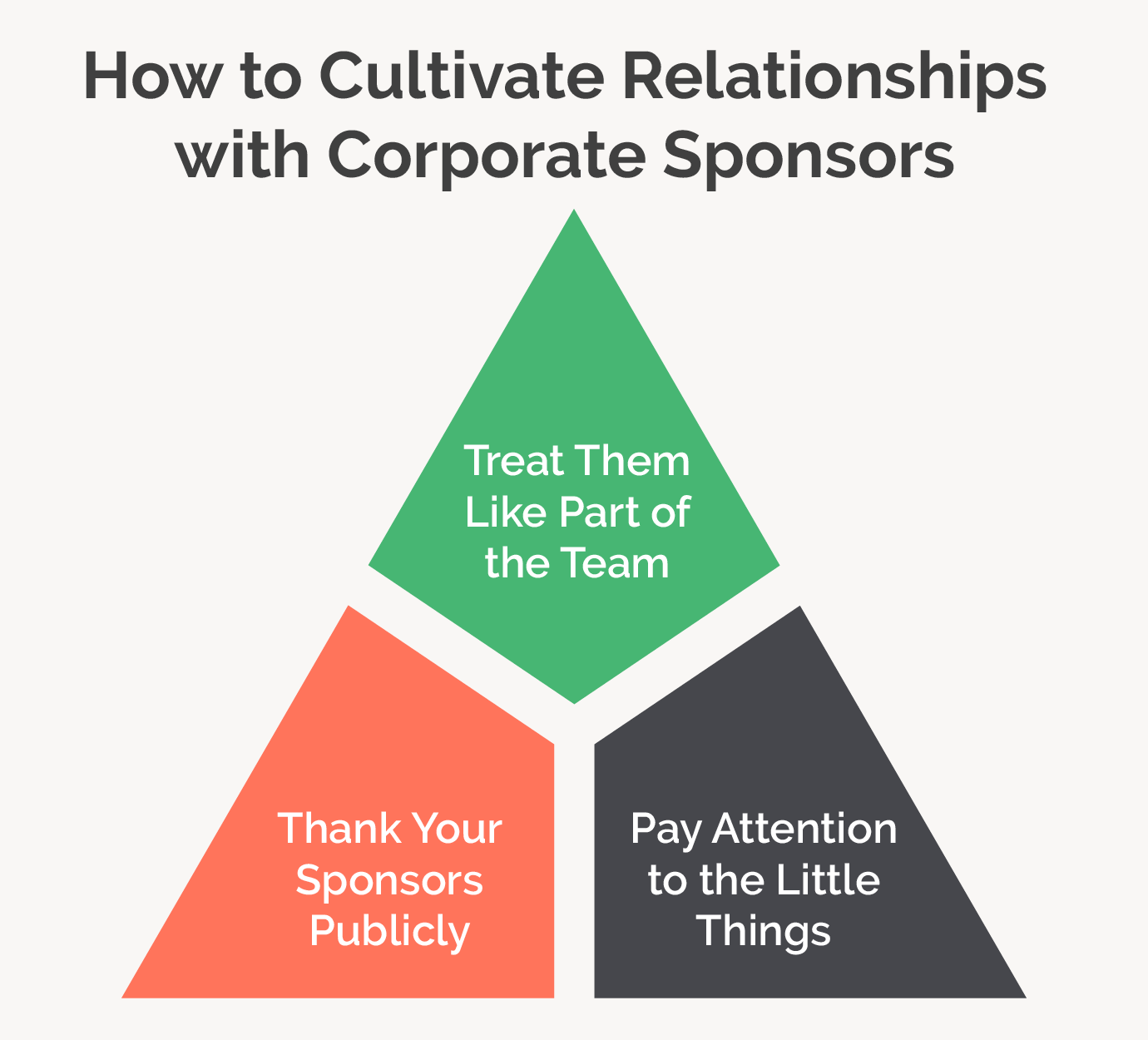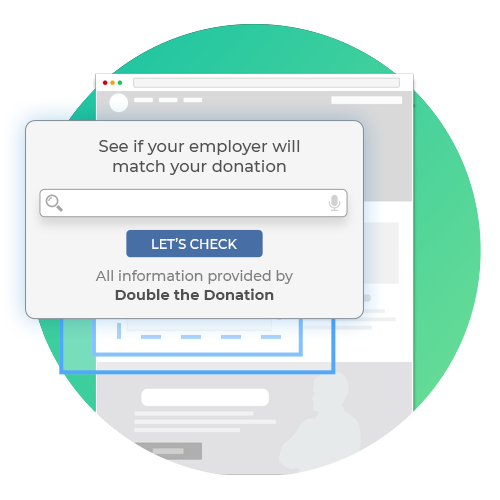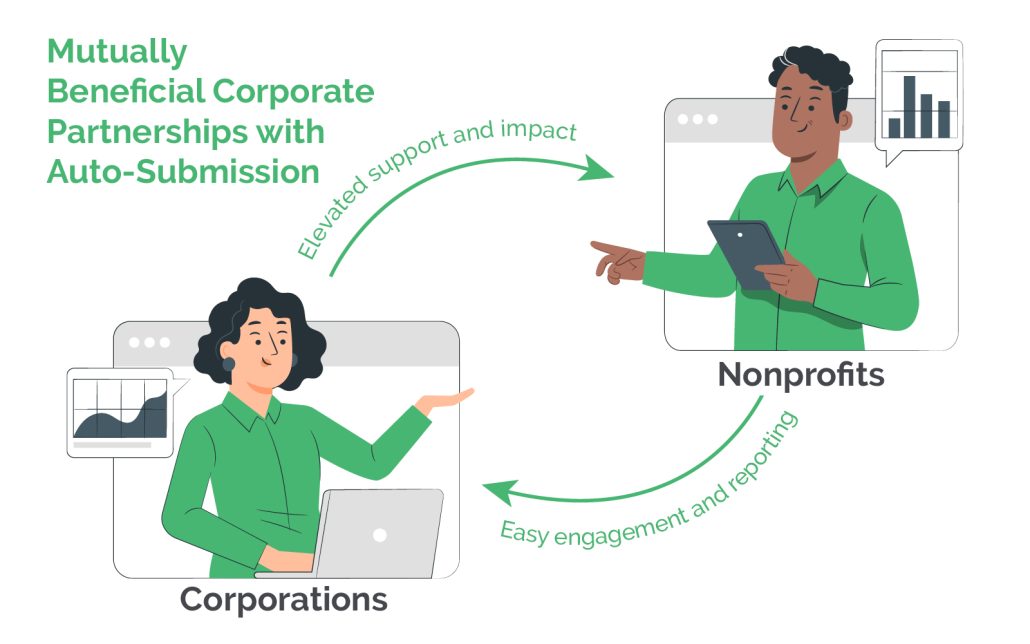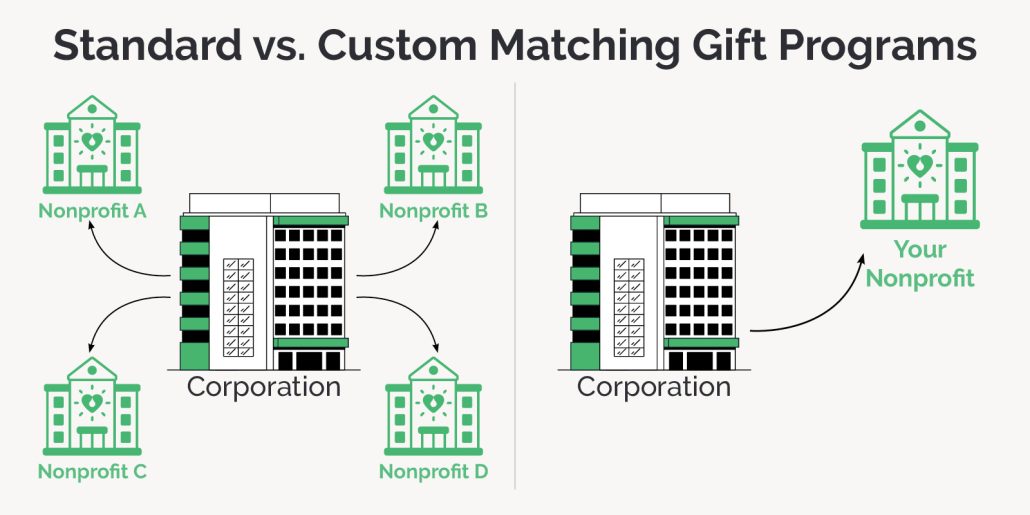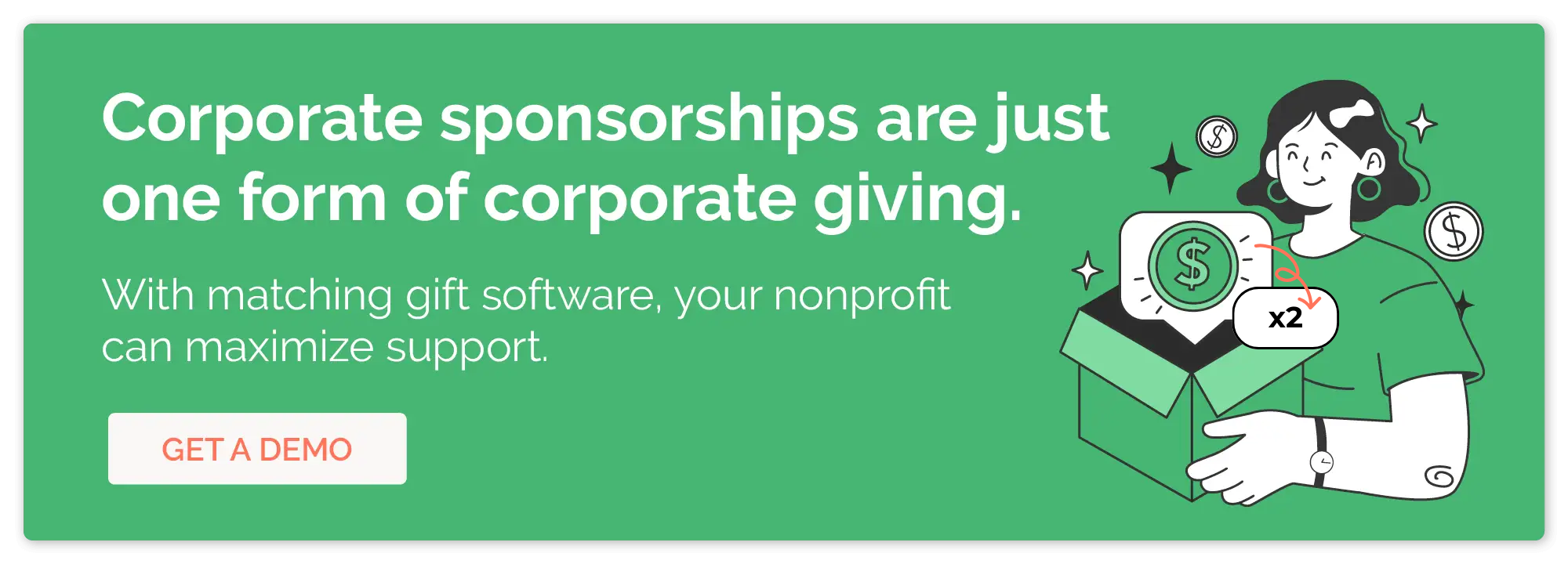How to Unlock Corporate Sponsorships: Get More Support
Securing corporate sponsorships involves building relationships with corporate prospects on top of all the other important work you’re doing to raise support for your nonprofit. But these partnerships are well worth it, as corporate giving can be an invaluable source of revenue, positive social image, and ongoing support.
In this article, we’ll discuss some corporate sponsorship best practices your organization can leverage to secure the best partnership suited to your cause, as well as some of the top corporate sponsors. We’ll cover the following topics:
- What is a Corporate Sponsorship?
- How to Find Corporate Sponsorships
- Companies with Excellent Corporate Sponsorship Programs
- How to Ask for a Corporate Sponsorship
- How to Cultivate Relationships with Corporate Sponsors
- Developing Mutually Beneficial Partnerships with Auto-Submission
- Additional Corporate Giving Programs
Understanding the importance of corporate sponsorships is just the beginning. Securing the right corporate sponsorship is another story entirely. Let’s get started!
What is a Corporate Sponsorship?
A corporate sponsorship is a form of support nonprofits receive from corporations to fund events, nonprofit programs, or specific projects. The benefits are twofold: nonprofits receive the help they need to continue serving their missions, while the company receives tax deductions and a positive reputation for its brand.
Corporate Sponsorship Types
Corporate sponsorships can take many forms. Here are a few examples of the most common types:
Financial
This is when a company donates money to sponsor an event or program. Generally, nonprofits recognize the company through various event materials, such as signage, merchandise, and online advertising, in exchange for its support.
In-Kind
An in-kind sponsorship involves a company donating goods or services to an event or project. For example, a restaurant might provide catering services, or a spa may donate free spa packages as a raffle prize.
Media
Some companies cover the cost of promoting a nonprofit event through media sponsorships. This could include radio promotions, TV ads, or printed advertisements.
Corporate and Employee Giving
Beyond typical corporate sponsorships, other forms of corporate giving can help your nonprofit. These include automatic payroll deductions, volunteer programs, and corporate matching gifts. Read more about these below!
Match More Gifts With Double the Donation
Get a sneak peek of the industry-leading matching gift automation solution, 360MatchPro.
Benefits of Corporate Sponsorships
Corporate sponsorships benefit both companies and nonprofits in the following ways:
Benefits for Nonprofits
- Increased awareness. By leveraging a company’s audience, nonprofits can share their mission with more people.
- Acquisition of new supporters. Corporate sponsorships can transform a company’s customers into their nonprofit partner’s supporters.
- Boosted credibility. If potential supporters see a well-known company supporting your nonprofit, they can be confident they’re contributing to a legitimate cause and organization.
Benefits for Companies
- Positive brand recognition. Helping nonprofits gives companies a chance to live up to their proclaimed values and demonstrate their community involvement.
- Attracting new customers. Just as a company’s customers can turn into a nonprofit’s supporters, a nonprofit’s supporters can also be converted into the corporate sponsor’s customers.
- Happy employees. When companies practice social responsibility, their employees can feel good knowing they’re working somewhere that honors their values and supports worthy causes.
Considerations to Keep In Mind Before Getting Started
Clearly, corporate sponsorships benefit all parties. But before getting started, there are a few things to be aware of to prepare for a sponsorship:
- Legal compliance. Depending on what kind of agreement you make with a business, the sponsorship may be qualified as a commercial co-venture. This usually occurs during cause marketing campaigns that involve sharing revenue (e.g., a retailer selling a shirt and giving your organization part of the proceeds). However, it’s best to check with a lawyer to ensure you are complying with the law and meeting your state’s licensing requirements.
- Dependency. Relying too heavily on support from sponsors, particularly just one or two businesses, could leave your nonprofit financially vulnerable if a business cannot or decides not to continue supporting your organization. Build a robust network of corporate connections and diversify your revenue sources to ensure your nonprofit is sustainable.
- Potential conflicts. Conflicts are a possibility in any relationship, ranging in seriousness from a misread email to ethical concerns. You can limit conflicts by selecting corporate sponsors with values that align with yours and clearly communicating shared responsibilities and expectations early in the relationship. Ensuring all sponsorship agreements are detailed in writing can be useful for preventing and navigating conflicts that may occur.
Don’t let these factors prevent your nonprofit from taking advantage of the benefits of a corporate sponsorship. Proper due diligence, careful documentation, and clear communication can help you manage and even prevent these concerns altogether.
How to Find Corporate Sponsorships
When it comes to asking for corporate sponsorships, be intentional about who you choose to work with. As you research potential partners, consider the following tips to narrow down your search:
Contact Local Businesses
Start local! Approach the businesses in the immediate area of your event. To find candidates, use resources like:
- Your local chamber of commerce directory
- Networking events
- Professional networking sites like LinkedIn
- Social media platforms
These businesses are more likely to see the value in sponsoring an event in their own community, which can greatly impact their decision to partner with you.
Seek Out Shared Values
A corporate partner should align with your organization’s mission. For instance, if you’re an environmental organization, you should work with a corporation that values sustainability, environmental conservation, and other related issues. Your organization could end up losing credibility if you partner with a corporation that substantially harms the environment or has received bad press.
Browse a business’s website, social media platforms, and other resources to get a feel for its values. Many companies list their values publicly. Then, discuss these values with the company’s point of contact before confirming the sponsorship to ensure you understand what they mean in practice.
Look Online
Search for lists of companies that donate to nonprofits online. These companies have a reputation for their philanthropic behaviors, so they might be more interested in forming a partnership than a business with no previous interest in charitable giving. You might find one you haven’t thought of before.
Leverage Points of Contact
If your board members or other members of your organization have connections or contacts at a particular company, ask them to directly reach out and request a sponsorship. Additionally, companies may be looking to fulfill the ethical and philanthropic obligations laid out in the pyramid of CSR.
Top 10 Companies With Excellent Corporate Sponsorship Programs
Zipsprout’s guide to corporate sponsors shares some interesting corporate sponsorship statistics. We’ve combined these statistics with insights from our robust database of matching gift and volunteer grant programs to highlight the best corporate sponsorship and relationship opportunities.
Check out these top corporate sponsors!
| Programs Offered | |
| Wells Fargo | Matching gifts and volunteer grants |
| State Farm | Matching gifts and volunteer grants |
| PepsiCo | Matching gifts and volunteer grants |
| U.S. Bank | Matching gifts and volunteer grants |
| Bank of America | Matching gifts and volunteer grants |
| Anheuser-Busch | Matching gifts |
| Clif Bar | Matching gifts |
| The Coca-Cola Company | Matching gifts |
| Walmart | Matching gifts and volunteer grants |
| McDonald’s | Matching gifts |
1. Wells Fargo
Wells Fargo has sponsored 2.89% of nonprofits in a database of nonprofits that publicly list their sponsors, placing them at #1 on the list of top corporate sponsors.
“Wells Fargo is committed to building an inclusive, sustainable future for all through a focus on opening pathways to economic advancement, championing quality, affordable homes, empowering small businesses to thrive, and driving an equity-focused transition to a low-carbon economy.”
Corporate Giving Information
Wells Fargo offers both matching gifts and volunteer grants. The company matches up to $2,000 per employee at a 1:1 ratio.
2. State Farm
State Farm has sponsored 1.07% of nonprofits in a database of nonprofits that publicly list their sponsors, placing them at #5 on the list of top corporate sponsors.
“With more than 19,000 agents around the country, State Farm is a committed member of your community and we welcome any opportunities that build our brand and tie into our marketing strategies on both a local and national level.”
Corporate Giving Information
State Farm offers both a matching gift program and volunteer grant opportunities. The company matches up to $4,500 at a 1:1 ratio for full-time employees.
3. PepsiCo
PepsiCo has sponsored 0.98% of nonprofits in a database of nonprofits that publicly list their sponsors, placing them at #6 on the list of top corporate sponsors.
“At the heart of the PepsiCo Foundation is our belief in the potential possessed by the people and communities we serve. There are far too many communities around the world, however, that are systemically excluded from access to the essential resources they need to grow, prosper and thrive — like nutritious food, safe water and economic opportunity. That is why the PepsiCo Foundation’s work focuses on the creation of sustainable and innovative solutions to these three critical socioeconomic issues.”
Corporate Giving Information
PepsiCo matches employee donations up to $10,000, with a minimum donation amount of $25. The company also offers a volunteer grant program.
4. U.S. Bank
U.S. Bank has sponsored 0.97% of nonprofits in a database of nonprofits that publicly list their sponsors, placing them at #7 on the list of top corporate sponsors.
“Nonprofit donations and sponsorship are an integral part of our company’s philanthropic initiatives. In 2022, U.S. Bank contributed more than $32 million in corporate contributions and nonprofit sponsorships.”
Corporate Giving Information
U.S. Bank matches up to $3,000 in donations made by active full- and part-time employees at a 1:1 ratio. The company also offers a “Dollars for Doing” volunteer grant program.
5. Bank of America
Bank of America has sponsored 0.92% of nonprofits in a database of nonprofits that publicly list their sponsors, placing them at #8 on the list of top corporate sponsors.
“We have countless strong nonprofit alliances around the country, which include grants and sponsorships to local organizations that help improve financial lives and entire communities. Some areas we concentrate on are workforce development and education, basic needs like food and housing, and community development.”
Corporate Giving Information
Bank of America offers matching gifts and volunteer grant opportunities. The company matches up to $5,000 in donations to most nonprofits at a 1:1 ratio.
6. Budweiser/Bud Light (Anheuser-Busch)
Budweiser has sponsored 0.76% of nonprofits in a database of nonprofits that publicly list their sponsors, placing them at #9 on the list of top corporate sponsors.
“We are business partners, collaborators, and community leaders working to make a difference around the corner and around the globe. We create jobs. We help our neighbors when natural disasters strike. We remain unwavering in our advocacy for responsible drinking. We put sustainable innovation at the center of our business by reducing our use of precious natural resources and continuously striving to leave our world a cleaner place for the future.”
Corporate Giving Information
Anheuser-Busch’s matching gift program matches donations up to $5,000 per year at a 1:1 ratio.
7. Clif Bar
Clif Bar has sponsored 0.74% of nonprofits in a database of nonprofits that publicly list their sponsors, placing them at #10 on the list of top corporate sponsors.
“From the volunteer work we do locally to the way we source ingredients globally, our commitment to the communities we touch is an important part of who we are.”
Corporate Giving Information
Clif Bar offers a matching gift program to active employees, matching up to $2,500 in donations at a 1:1 ratio.
8. The Coca-Cola Company
The Coca-Cola Company has sponsored 0.72% of nonprofits in a database of nonprofits that publicly list their sponsors, placing them at #11 on the list of top corporate sponsors.
“Our mission is to make a difference in communities around the world by investing in transformative ideas and institutions that address some of our most pressing global challenges.”
Corporate Giving Information
The Coca-Cola Company offers a very generous matching gift program. The company contributes up to $20,000 per employee per year, matching at a 2:1 ratio.
9. Walmart
Walmart has sponsored 0.68% of nonprofits in a database of nonprofits that publicly list their sponsors, placing them at #12 on the list of top corporate sponsors.
“We seek to create value in the communities around the world where we operate, strengthening them through local grants supporting programs that help them thrive.”
Corporate Giving Information
Walmart matches up to $25,000 in donations made by executive-level employees at a 3:1 ratio. The company also offers a volunteer grant program.
10. McDonald’s
McDonald’s has sponsored 0.67% of nonprofits in a database of nonprofits that publicly list their sponsors, placing them at #14 on the list of top corporate sponsors.
“We show our commitment to helping others by facilitating fundraising and engaging volunteers for Ronald McDonald House Charities® programs and the McDonald’s® HACER® National Scholarships. Through involvement in youth sports, local charities and events that inspire the world, giving back is an essential part of the way we operate every day.”
Corporate Giving Information
McDonald’s offers a very generous matching gift program, matching up to $10,000 in employee donations (depending on role) per year at a 1:1 ratio.
How to Ask for a Corporate Sponsorship
Once you’ve identified corporations you want to partner with, it’s time to plan how you’ll approach them. Forming the right ask depends on your goals, who you’re reaching out to, and when you plan to make contact. Here’s a helpful list of strategies to help you make the ask:
Promote Your Sponsorship Page
Creating a sponsorship page on your nonprofit’s website is a great way to condense the must-know information about sponsoring your organization. Include information like:
- Your sponsorship levels
- A case for support that explains why you need sponsors
- How an interested company can reach out to your team
Then, promote this page across different channels, such as social media and paid advertising platforms like Google Ads. You can tap into paid advertising for free with the Google Ad Grant! If you apply and are approved, you can promote content like your sponsorship page on Google Search Results for relevant keywords.
Finding the right keywords can take some work, but you can always turn to a professional to handle the work for you. A Google Ad Grants expert like Getting Attention can help you optimize your sponsorship landing page and promote it using Google Ads.
Be Creative
You can ask a company to sponsor just about anything. Use aspects of your event that already exist, and turn them into sponsorship perks. Then, be sure to position them as excellent sponsorship opportunities for your potential partners.
Set the Right Sponsorship Levels
Just like you receive a variety of donation amounts from individual supporters, establish multiple levels of sponsorship for corporations to agree to. If you have an event with hundreds or thousands of people, make sure your sponsorship levels are high enough (such as $1,000 and up). You don’t want sponsorship to be priced so high that no one will want to participate, but by keeping levels elevated, sponsors will feel like the event is well-run and that you have confidence in what you’re doing.
On the other hand, if you’re planning a smaller event and have difficulty securing a large sponsorship, consider offering a lower sponsorship level with fewer perks. For instance, you could offer a $100 level for smaller businesses not interested in the larger sponsorship opportunity.
Explain Why You’re a Perfect Fit
As you make your ask, explain how this corporate partnership will contribute to building up the company’s brand. Do your missions align? What will working with your nonprofit help the company achieve in terms of its own goals? Keep these in mind and communicate them as clearly as possible.
Ask About the Company’s Objectives
That said, asking the company directly about its objectives and priorities demonstrates that you’re genuinely interested in bringing value to the partnership. Remember, your corporate sponsors have objectives, or “missions,” of their own. They’ll want to know they’re supporting a nonprofit that aligns with these goals and that the sponsorship can help them achieve them.
Tell a Story
Explain to potential sponsors how their sponsorship and support can directly impact someone as part of your mission. For instance, “$1,000 will help us provide meals to 5 families of 4 for a week.” Additionally, share how last year’s sponsors were able to help your organization accomplish its goals.
Tailor Your Ask
Rather than using one main template and filling in names, make your ask personal and write individualized letters. These should be addressed to a relevant person at the company who is most likely to be receptive to hearing about your cause. Make sure you do your research on who to ask. Go beyond just marketing contacts and speak to anyone who will sympathize with your mission and also be in a position to create a plan of action!
Consider In-Kind Donations
If a business declines to offer a monetary sponsorship, consider asking for a non-monetary sponsorship instead, such as coupons for free services on event day. You can also request that a portion of their proceeds on the event day be donated back to the organization. A business in the area could serve as a location for the kick-off party, packet pick-up, or after-event party.
You can also reach out to companies to provide services you’ll need at the event, such as photography, DJ/entertainment, signage, food, portable toilets, and tent/chair rentals. The value of their goods or services can certainly equate to a sponsorship level.
Leverage Your Data
Always back up your corporate sponsorship asks with supporter data! Determine what demographics a sponsor is targeting, and provide them with information about your event that would be relevant. For example, if a company tends to target women aged 50 to 60, let the company know how many people or what percentage of participants attending your event fall into that group.
Find the Right Timing
The timing of your sponsorship ask is important. A lot of larger companies earmark a specific amount of money each calendar year for charitable giving, so be sure to ask when is the best time for them to consider a sponsorship.
Oftentimes, you have to get your ask in very early to even be considered. Other times, you have to adjust your strategy to the business you’re reaching out to. For instance, if you’re reaching out to an accounting firm during tax season, you’re most likely not top-of-mind, and your request may go unanswered.
Propose a Plan
Part of crafting an appealing sponsorship ask means outlining your campaign initiatives and success metrics. This means defining your fundraising goal and the impact it will have first and foremost.
As mentioned before, use numbers and data to support your proposal. But also be sure to define your success metrics and use KPI benchmarks that show when you’ve achieved your fundraising goals. Be specific about how your organization plans to meet its objectives, and link this process to ongoing projects, as well.
Draft a Sponsorship Agreement
The biggest thing that will demonstrate that you’re professional and committed to the partnership is a sponsorship agreement. It should be written down to outline your goals, expectations, and other deliverables for your organization and the company. It’s also a good idea to include how you’re going to recognize the company for its support, such as through advertising materials, merchandise, or event printouts.
Follow Up
Haven’t heard back? Don’t give up! Continue to communicate with companies after you’ve reached out with a corporate sponsorship request. Always check back to ensure someone has received your call, email, or letter. If not, ask to speak to the appropriate person at the company, and/or resend your ask to that person.
How to Cultivate Relationships with Corporate Sponsors
Once you’ve secured your corporate sponsorship, don’t let the relationship fall by the wayside! In addition to presenting your partnership in a professional light, continuing to recognize and work with your sponsor can have a huge impact on your organization.
Here are some effective ways to work with a sponsor after they’ve agreed to support your cause:
Treat Them Like Part of the Team
Treat your corporate sponsors like part of the team, because they are part of the team. Many sponsors will feel more engaged and recognize that they’re getting more from their sponsorship if they hear from you often. This doesn’t mean sending them an email every day, but rather, treating them like a team member.
Use the same engagement tools and approaches you use with participants to connect with your sponsors. For fundraising events, offer them a free team captain registration, help them get their page set up, and provide fundraising coaching. The more a sponsor raises and the larger their team, the more exposure they will get. This will in turn make them feel like they’re getting more out of the sponsorship.
Pay Attention to the Little Things
Yes, big perks matter, but the little touchpoints make a big difference, too. Send a handwritten thank-you letter or a note from a participant or beneficiary of your cause’s work. If the sponsor also fundraised for your campaign, create a top fundraisers certificate that you send to them by mail.
These little touchpoints show that you acknowledge the importance of their support, yet the cost is minimal, which demonstrates good stewardship by not wasting the sponsor’s money.
Thank Your Sponsors Publicly
Feature sponsor logos and information in your event materials, such as merchandise, pamphlets, and online advertisements and emails. Then, give a shoutout on social media! Tag their company or business page, and publicly thank them in a post.
This will help your sponsor gain exposure as a reward for supporting your event, and it will also help solidify your partnership as beneficial and worthwhile in terms of the company’s branding. Most likely, the company will then re-post your original post to its full audience to help your event reach new constituents.
Additional Corporate Giving Programs
Corporate sponsorships are a fantastic source of funding and support for your nonprofit’s events and projects. But you should also research other forms of corporate philanthropy. Especially when combined with a corporate partnership, other types of philanthropy can maximize your fundraising revenue and keep your supporters engaged.
Of course, managing different areas of workplace giving like matching gifts, volunteer grants, payroll giving, and more can be tricky if you don’t have a centralized platform. Seek out software that can help you identify opportunities, collect data, and share insights for oft-overlooked types of corporate giving. This way, you’ll be able to capitalize on more opportunities for support, growing your funding and support through one organized database.
Here are a few of the different types of corporate giving opportunities your nonprofit can seek out and manage with software:
Matching Gifts and Fundraising Matches
Corporate matching gifts are the most popular type of corporate giving program with more than 26 million individuals working for companies with matching gift programs.
Through these programs, companies match the donations their employees make to eligible nonprofits. Typically, these matching gifts occur at a 1:1 ratio, but some companies will match at a higher rate. This means that your donors’ gifts could be doubled (or even tripled!) at no additional cost to the supporter.
Additionally, some employers match funds their employees raise on behalf of a nonprofit. For example, if you hold a walk-a-thon and an employee raises $250 in pledged donations, the match would bring it to a grand total of $500!
If you’ve already set up a partnership with a company, their employees will be encouraged to donate to your cause. While they are a popular form of corporate giving, matching gifts are still an overlooked revenue source. That’s why it’s important to raise awareness among all of your donors and supporters, whether they’re connected to known sponsors or not.
To help raise awareness among your supporters about matching gifts, consider investing in matching gift software. A solution like 360MatchPro by Double the Donation offers:
- A comprehensive matching gift database that houses information about thousands of companies and their corporate giving programs. Donors can search for their employers using a straightforward search tool, which can be easily embedded into your website.
- Email tools that help you identify matching gift opportunities within your existing donor database and trigger emails to relevant donors.
- Email address detection tools that can identify opportunities based on a donor’s email domain. For example, 360MatchPro can automatically pick up that an email address like donorname@wellsfargo.com means the donor likely works for Wells Fargo.
- Follow-up emails that remind donors to check with their employer for matching gift opportunities.
- Automatic match request submission for donors whose employers use a CSR software vendor that partners with Double the Donation.
These are just a few of the features that 360MatchPro offers to spread awareness of matching gifts, remind employees to apply for them, and allow you to take advantage of this key revenue stream.
Corporate Grants
Corporate grants are gifts that businesses make to nonprofit organizations, usually for a specific purpose. Like other grants, these may involve an application process and often require your nonprofit to report how the grant was spent and the impact that funding had.
These grants can vary in size and scope, and they may be given in the form of:
- Cash
- In-kind donations (e.g, free products or pro bono services)
- Other resources your organization may need
When it comes to finding corporate grants for your nonprofit, start with corporations you’ve already worked with during event sponsorships or other partnerships. Additionally, check online grant directories to source new funding opportunities.
Volunteer Grants
When you’re running your mission-relevant programs or any kind of fundraising event, it’s likely that your team will need volunteer assistance. But what if there was a way to turn these already beneficial volunteer hours into another source of fundraising revenue?
Volunteer grants are another common form of corporate philanthropy in which companies provide monetary grants to organizations where their employees regularly volunteer. If you fold this into your already established corporate partnerships, you may very well end up with extra funds for your mission!
Ask corporate sponsors to encourage their employees to volunteer at your event—especially if those volunteers offer specific skill sets that can benefit your cause. If the company also offers a volunteer grant program, this means you’ll get much-needed help at the event itself and you’ll raise more money.
Even if your volunteers don’t come from corporate partners, encourage them to look up their eligibility for a volunteer grant. Many matching gift databases also offer information about volunteer grants! 360MatchPro’s search tool allows volunteers to find their employers’ volunteer grant program details. Embed the search tool into your volunteer page for easy access.
Volunteer Time Off (VTO)
Volunteer time off (VTO) is paid time off that employees can use to volunteer. VTO hours are designated specifically for volunteer opportunities with registered nonprofit organizations, meaning employees can take time off during the workday to help your organization.
These programs provide employees with flexibility and help them fulfill their desire to better their communities. For your nonprofit, VTO policies can bring significant benefits like:
- Providing more volunteers without investing time and resources into recruiting.
- Expanding your volunteer pool can lead to more regular volunteers, a boost in volunteer referrals, and additional support for future events, programs, and campaigns.
- Attracting volunteers with diverse skill sets (e.g., professional services like graphic design) to help you accomplish more with just the help of your supporters.
- Boosting retention by giving these new volunteers an easy way to fit future volunteer shifts into their busy schedules.
Similar to volunteer grants, you can leverage your partner company’s VTO policy during the sponsorship. For example, employees might take an afternoon off of work to visit your facility the day before an event and help set up. Or, they might return after the event to help you write thank-you notes for donors.
Payroll Giving
Payroll giving, sometimes called automatic payroll deductions, is another perk of building relationships with companies. Employees can arrange to have a certain amount deducted from their paycheck and automatically donated to a nonprofit of their choice.
Some of the top advantages of encouraging employees to engage in payroll giving include:
- A lack of transaction fees.
- The ability to build long-term relationships (particularly if you provide updates about the impact of these gifts).
- Funding you can count on.
These recurring donations can make a huge difference for your organization. Like a monthly giving program, they provide sustainable, reliable funding that you can expect each month. This makes budgeting easier and more accurate, helping you plan projects to fulfill your mission and maximize your funding.
In-Kind Donations
As you probably guessed from reading about in-kind sponsorships above, in-kind donations involve companies donating equipment, products, or services, rather than money. This expands beyond your fundraising events. Maybe your team needs marketing or tax assistance. Many companies are willing to provide these services to nonprofits free of charge!
Educating your organization about the various corporate giving programs out there can help boost your fundraising revenue. Pair that with strong corporate partnerships, and you’ll have the resources you need to continue serving your mission!
Developing Mutually Beneficial Partnerships with Auto-Submission
The most successful corporate partnerships are built on a mutually beneficial foundation between charitable organizations and for-profit companies. One of the best ways to improve both parties’ sponsorship outcomes is to make the process as easy as possible for everyone involved. That’s why we recommend implementing corporate giving auto-submission!
Double the Donation’s auto-submission functionality is a groundbreaking development in the world of matching gifts and corporate partnerships. And it can aid nonprofit fundraising in a few key ways.
How Auto-Submission Improves Standard Matching Gift Experiences
Auto-submission makes matching gifts easier than ever for nonprofit organizations, their donors, and the companies that support them. Specifically, it enables eligible individuals to complete their match requests in significantly fewer steps—meaning more matches are ultimately completed and fulfilled.
It also reduces the administrative workload for the nonprofit and business, which allows each group to make a larger impact. Not to mention, auto-submission capabilities include improved reporting practices, complete with new data points that allow organizations to better track matches through the process.
Introducing Custom Matching Gift Partnerships
On the other hand, there’s a wide range of companies that may not feel prepared to jump into a full-fledged matching gift program for their staff. However, they want to find a way to support nonprofit causes and inspire their employees to do the same.
Our recommendation for these types of partnerships is a custom (or “one-off”) matching gift program—where a company will agree to match employee donations to a single organization. These are typically more targeted partnerships than a standard matching gift program, which allows for deepening relationships between a nonprofit and a corporate sponsor. And auto-submission allows these partners to facilitate their offering with minimal lift.
Organizations that use 360MatchPro can create custom match programs that are exclusive to their own database tool. And when auto-submission is enabled, employee giving transaction details are automatically passed from the nonprofit’s donation page to the business offering the program.
Additional Resources on Corporate Sponsorships
Corporate sponsorships can have a huge impact on more than just the money your organization brings in. They also affect your organization’s brand recognition, exposure, and credibility. Be sure to choose the right corporate partners for your sponsorships and put in the required research to find the best match.
Looking for even more information about corporate philanthropy? Check out these resources below:
- Double the Donation’s Matching Gift Academy. Learn how matching gifts can inform your corporate sponsorship approach! Dive into Course 1, Module 11 of our Matching Gift Academy.
- Navigating Corporate Philanthropy: A Nonprofit Playbook. Learn the ins and outs of corporate philanthropy with this comprehensive guide.
- Fundraising Letters & Templates to Inspire More Support. Need to write a sponsorship letter or another type of appeal? Check out these helpful tips and templates!
- Corporate Philanthropy Examples: Companies Doing It Right. Looking for some examples of companies that take part in corporate philanthropy? Explore this list of top participants!
